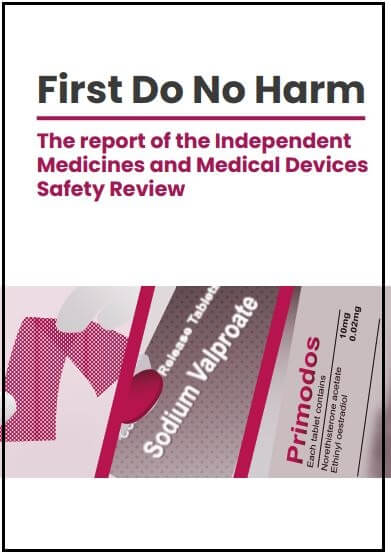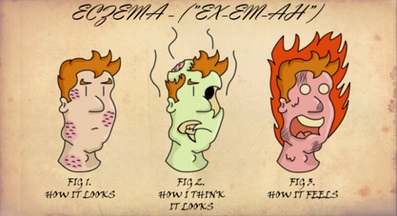We expect our doctors and the expert dermatologists who treat us will help heal us, not harm us. It’s not too much to ask is it? I think we all expect that basic truth.
Doctors should all have one main aim, to help patients get better.
You’ve no doubt heard the term ‘Bedside Manner’, referring to a doctor’s ability to find compassion, listen and ensure the patient feels their needs and fears are understood and their treatment is something they are comfortable with.
How many of us really feel seen and heard? In the eczema community, sadly not that many of us.
Right back in 460 BC Hippocrates, a Greek physician, wrote of his oath to uphold certain standards in his work. Mainly to see the patient as a person and not just as an illness.
It should go without saying that all doctors should strive listen with compassion and also to Do No Harm to their patients.
However there have been a number of occasions where the medicine given to people to heal them makes them worse. I’m thinking of the Thalidomide scandal in the 1950s where pregnant mothers, who were given the drug to counteract nausea gave birth to babies with malformed limbs.

More recently the Independent Medicines and Medical Devices Safety Review was announced in February 2018. It was asked to focus on how the health system responds when patients and their families raise concerns about the safety of treatments. Baroness Cumberlege was asked to chair the review and to look at the cases of:
- vaginal mesh
- sodium valproate
- hormone pregnancy tests (HPTs), in this case Primodos
Read the First do no harm report from Baroness Cumerlege here.
It’s over 280 pages long but the main gist of the report was to investigate surgeries and treatments that were not fit for purpose, malfunctioned, caused damage, ongoing pain, resulting in further surgery to fix the problem… and so much more.
The Review published its report on 8 July 2020 and made 9 recommendations to parliament, many of which have not yet been acted upon.
Here are just some of the findings from statements of patients. Sounds so similar to the journey of many of us with TSW:
- the lack of information to make informed choices;
- lack of awareness of who to complain to and how to report adverse events;
- the struggle to be heard;
- not being believed;
- dismissive and unhelpful attitudes on the part of some clinicians;
- a sense of abandonment;
- life-changing consequences, not only for those directly affected, but for their families and friends too;
- breakdown of family life;
- loss of jobs, financial support and sometimes housing;
- loss of identity and self-worth;
- a persistent feeling of guilt;
- children becoming their mothers’ and siblings’ carers;
- clinicians untutored in the skills they need to make a proper diagnosis;
- clinicians not knowing how to learn from patients;
- inaccurate or altered patient records;
- a lack of interest in, and an inability to deliver, the monitoring of adverse
- outcomes and long-term follow-up across the healthcare system.
Sound familiar?
Nothing at all to do with topical or oral steroids, but I think you’ll agree. the parallels and findings have so many similarities.
Is history repeating itself?
How many times will pharmaceutical companies create products that become mainstream treatments where no one listens to the cries and pleas of those using the drugs, becoming ill, losing hope, struggling to cope.
No one is tracking patient histories.
No one is listening to the concerns of the people using the treatment.
We become just an illness and not a person. Hippocrates will be turning in his grave!
So what can we do?
We need a review of topical steroid use
We need a review
We need change
We need recognition
We need an apology
We need diagnosis pathways to be holistic
We need redress and support for those who need it
We need clearer guidance for reporting medication we think has harmed us
We need a system which alerts and updates both patients and doctors when new guidelines are made
We need the Hippocratic Oath
We need treatments that DO NO HARM
What we do not NOT need is to constantly gaslit, misunderstood, ignored and belittled.
We need TSW added to all our patient records. We need this red flag to be flashing in the NHS system.
We need to tell our doctors our concerns.
We need to stand up and be counted.
We need so much and currently we are not getting anything at all.
I feel helpless, what can I do?
If you or a loved one is feeling frustrated because topical steroids have done them untold hard and no one seems to care, there are some things you can do.
- Complete the Yellow Card Scheme form – detailing when you began treatment and what damage has been done to you and submit it to the J+MHRA. Read How to report topical steroid addiction here.
- Join us for a TSW March in March 2022 – Meeting at St Thomas’s Hospital in London at 11am on Saturday 26th March 2022. Follow Topical Debate on Instagram for all the details.
- Sign the petition to help Fund Research into Topical Steroid Withdrawal. We have nearly 5,000 signatures but we need over 10,000 for government to start talking about this
- Write to your MP – Tell then your concerns, share your experience and ask them to help. You can download a template from the Scratch that website. Download the TSW MP letter here.
- Tell your story – Share what’s happening with your friends, family, GP, social media. By talking we can start the process of change.
I’ve been talking to my MP Sarah Green of the Liberal Democrats and she has so far been very open and helpful. We had a 20 minute zoom call and she has taken actions to speak to the Department of Health and other organisations on my behalf. It’s a start. I will now be writing to her to ask for another Do No Harm review, similar to the one discussed above, into the damage done by topical steroid withdrawal. Together we can make a difference.












Leave a Reply